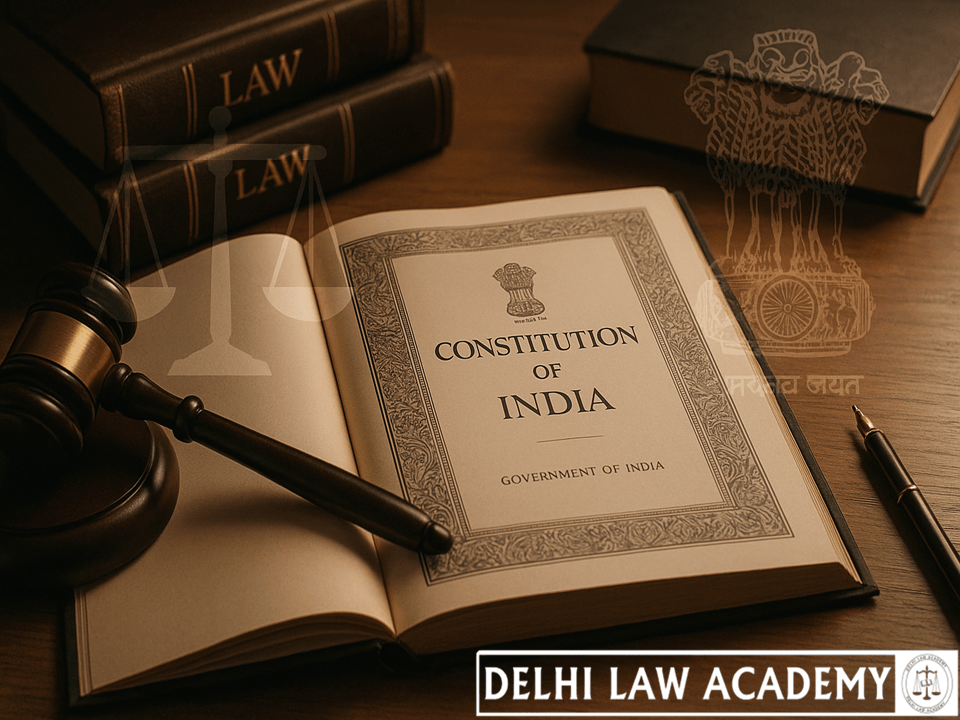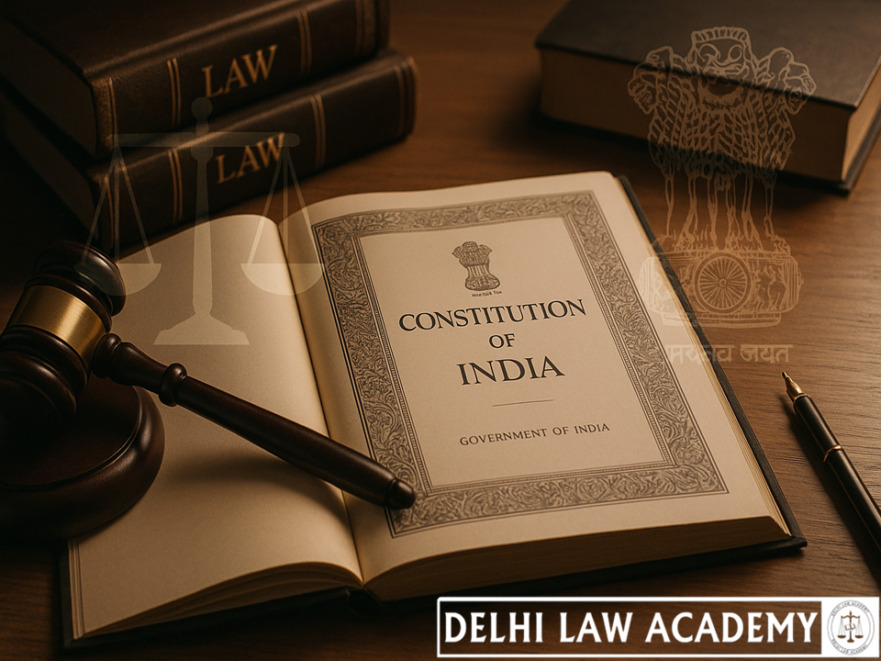
📘 Key Topics Covered in this Blog
- 📰 Freedom of Press
- ℹ️ Right to Information
- ⚖️ The Law of Sedition
- 🛡️ The Law of Defamation
- 📑 Reasonableness of Restrictions
- 🌍 Freedom of Speech as a Basic Human Right
✅ Explore how the Supreme Court has shaped these principles and their constitutional validity.
⚖️ Right to Freedom under Article 19
🕊️ The 6 Freedoms (Article 19(1))
All citizens shall have the right:
- (a) to freedom of speech and expression 🗣️
- (b) to assemble peaceably and without arms ✊
- (c) to form associations, unions or cooperatives 🤝
- (d) to move freely throughout India 🚶
- (e) to reside and settle in any part of India 🏠
- (g) to practise any profession or to carry on any occupation, trade or business 💼
📌 Note
- Article 19(1)(f) [Right to acquire, hold and dispose of property] was deleted by the 44th Amendment 1978.
- This right is now incorporated in Article 300A.
🚫 Restrictions on the Freedoms
Article 19(2) – Restrictions on freedom of speech
State can impose reasonable restrictions by law on grounds of:
- Sovereignty and integrity of India
- Security of State
- Friendly relations with foreign states
- Public order
- Decency
- Morality
- Contempt of court
- Defamation
- Incitement to offence
⚖️ Case: Subramanian Swamy v. Union of India (2016 SC)
Question: Does the offence of defamation (Sections 499 & 500 IPC) conflict with the fundamental right of freedom of speech?
Answer: The Supreme Court held:
- Defamation harms the reputation of a person, which is part of Article 21.
- “Reputation” cannot be destroyed in the name of free speech.
- Defamation laws strike a balance between freedom of speech and protection of individual reputation.
- Criminal defamation is within the reasonable restrictions of Article 19(2).
Article 19(3) – Restrictions on right to assemble peaceably
- Sovereignty and integrity of India
- Public order
Article 19(4) – Restrictions on right to form associations
- Sovereignty and integrity of India
- Public order
- Morality
Article 19(5) – Restrictions on right to move freely and reside
- Interests of general public
- Protection of interests of Scheduled Tribes
Article 19(6) – Restrictions on profession, trade, etc.
- Reasonable restrictions in the interest of general public
- Professional or technical qualifications may be specified by law
- State may carry on any trade, business, etc. to the exclusion of citizens
📰 DLA’s Comments on Article 19
Freedom of Press
- Freedom of speech and expression includes freedom of press.
- Liberty of the press is inseparable from the right to freedom of speech and expression.
- Authority: Indian Express Newspapers v. Union of India (1984 SC)
🗣️ Freedom of Speech and Expression under Article 19
📖 Right to Information
- Freedom of speech and expression includes the right to acquire information and to disseminate it.
- Freedom of speech and expression is necessary for self-expression, which is an important means of free conscience and self-fulfilment.
- It enables people to contribute to debates on social and moral issues.
🌍 Freedom of Speech as a Basic Human Right
- Freedom of speech is the bulwark of a democratic Government.
- This freedom is essential for proper functioning of the democratic process.
- Freedom of speech and expression is regarded as the first condition of liberty.
- It plays a crucial role in the formation of public opinion on social, political and economic matters.
- It has been described as a “basic human right” or “a natural right”.
⚖️ Reasonable Restriction
- The phrase “reasonable restriction” connotes that the limitation imposed on a person in enjoyment of the right should not be arbitrary or of an excessive nature, beyond what is required in the interests of the public.
- The word “reasonable” implies intelligent care and deliberation, that is, the choice of a course which reason dictates.
- Legislation which arbitrarily or excessively invades the right cannot be said to contain the quality of reasonableness.
📌 Reasonableness of Restrictions
- In judging reasonableness of the restrictions imposed under Article 19(6), Court has to bear in mind the Directive Principles of State Policy.
- A restriction which has the effect of promoting a directive principle can be presumed to be a reasonable restriction in public interest.
⚖️ Constitutional Validity of Laws Restricting Freedom of Speech and Expression
(i) 📝 The Law of Sedition
- Though the section imposes restrictions on the fundamental freedom of speech and expression, the restrictions are in the interest of public order and are within the ambit of permissible legislative interference with the fundamental right.
- A citizen has a right to say or write whatever he likes about the Govt or its measures by way of criticism or comment so long as he does not incite people to violence against the Govt or with the intention of creating public disorder.
- So construed, the section strikes the correct balance between individual fundamental rights and the interest of public order.
(ii) 🛡️ The Law of Defamation
- Right to free speech cannot mean that a citizen can defame the other.
- “Reputation” of one cannot be allowed to be crucified at the altar of the other’s right of free speech.
📚 Continue Your Constitution of India Preparation
Don’t stop here! Strengthen your knowledge of the Fundamental Rights with our other related blogs:
📘 Stay Ahead with Delhi Law Academy!
Get access to free monthly current affairs, read our insightful blogs,
and explore free study resources prepared by experts at DLA Jaipur. 🚀
❓ Frequently Asked Questions (FAQs)
The Supreme Court in Indra Sawhney v. Union of India (1992) upheld reservations in appointments under Article 16(4). However, it placed a 50% ceiling on total reservations and clarified that reservation in promotions was not permitted under Article 16(4). This landmark judgment shaped the framework of affirmative action in India.
Initially, Indra Sawhney barred reservations in promotions. However, the 77th Constitutional Amendment introduced Article 16(4A), which explicitly allowed reservations in promotions for SCs and STs. Later, in M. Nagraj v. Union of India (2006), the Court upheld this provision but imposed strict conditions such as proving backwardness, inadequate representation, and efficiency in administration.
Articles 16(4A) and 16(4B) were inserted to ensure reservations in promotions and to protect consequential seniority of SC/ST employees. The Supreme Court in M. Nagraj upheld these provisions but required states to collect quantifiable data proving the need for such reservations.
Article 16(6), inserted by the 103rd Constitutional Amendment (2019), introduced reservations for Economically Weaker Sections (EWS) in government jobs. This was the first time that economic criteria alone was used as a basis for reservations, separate from caste-based affirmative action.
Yes ✅. In Janhit Abhiyan v. Union of India (2022), the Supreme Court upheld the validity of the 103rd Amendment. The Court ruled that providing 10% reservation to EWS did not violate the basic structure of the Constitution, even though it exceeded the 50% reservation ceiling set earlier in Indra Sawhney.
The Supreme Court in M. Nagraj v. Union of India (2006) upheld the 77th Amendment, which allowed reservations in promotions. However, it placed safeguards requiring states to justify such reservations with data on backwardness, under-representation, and administrative efficiency. Thus, while the amendment was valid, its application was made conditional.
Contact us
📍 Delhi Law Academy – Jaipur Branch
6C, Tower 2, Coaching Hub, Pratap Nagar, Jaipur – 302033
📞 Phone:
+91 9911916552
+91 8447285606
✉️ Email:
contactus@delhilawacademy.com

